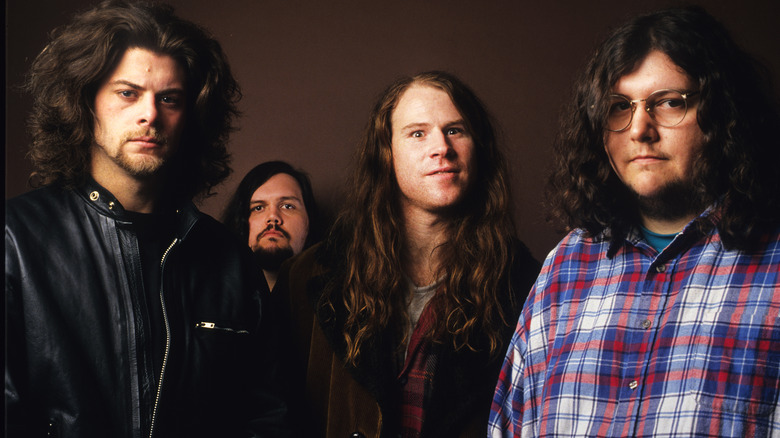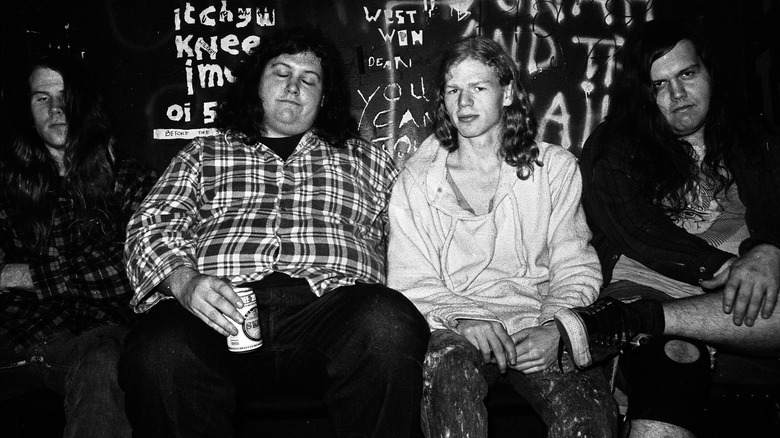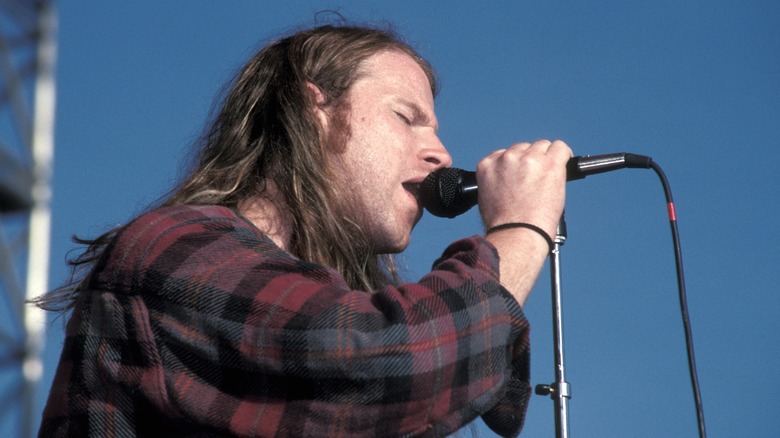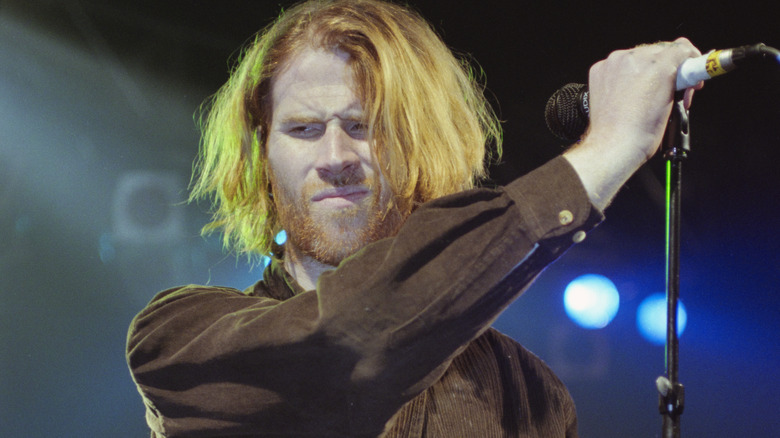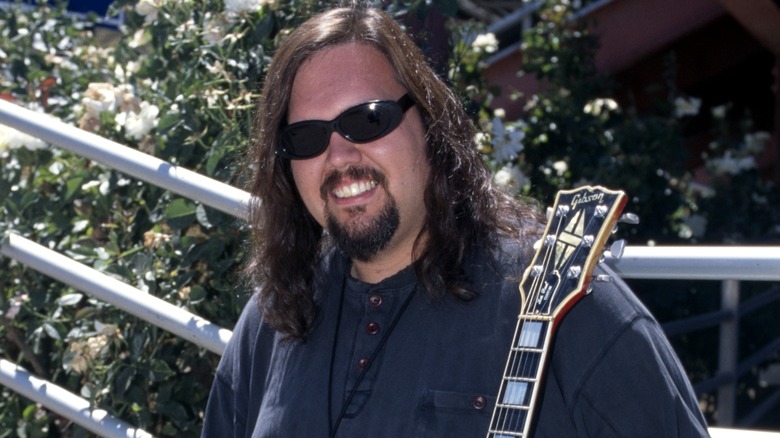The Tragic Real-Life Story Of Screaming Trees
We may receive a commission on purchases made from links.
Arguably, Screaming Trees are a band that doesn't get as much recognition as it should. Originally formed in the mid-'80s as a group largely influenced by obscure '60s garage and psychedelic rock bands as well as underground punk bands, the Trees — singer Mark Lanegan, guitarist Gary Lee Conner, bassist Van Conner, and drummer Barrett Martin — were among those who gained prominence in the wake of the early '90s grunge boom but never reached the same levels of commercial success that Nirvana, Pearl Jam, Soundgarden, and Alice in Chains did. In fact, many fans may remember them best as a rock one-hit wonder of sorts (not quite true) that didn't do much after singing about nearly losing someone there. Or as the band that feuded with Liam Gallagher after the Oasis frontman mockingly called them the "Howling Branches" (via Louder).
That likely changed in the aftermath of Lanegan's tragic death on February 22, 2022, as his passing reminded people that for a brief period in the 1990s, he was part of a band that was showing a lot of promise. And while the Screaming Trees were modestly successful throughout their career, their decade-and-a-half history as a band was filled with challenging moments, with their post-breakup history including a fairly recent feud between two ex-members that gained a lot of media attention.
They mostly knew each other from school, but were never the best of friends
The Screaming Trees story starts way back in 1985 in Ellensburg, Washington, when Mark Lanegan joined forces with brothers Van and Gary Lee Conner and original drummer Mark Pickerel. The four young men knew each other from their time in Ellensburg High School, but unlike most bands whose members attended the same school and were familiar with each other before becoming bandmates, the Trees were notorious for their frequent intra-band skirmishes. In his memoir "Sing Backwards and Weep," Lanegan wrote that he "often found [himself] counting the seconds before [he] strangled Lee to death," referring to the band's guitarist, who mainly goes by his middle name.
Lee Conner admitted as much in an interview with Velvet Sheep, explaining that there was "nothing insane" but that the band did have its share of on-stage fights. And while they may not have been as antagonistic toward each other as, say, Noel and Liam Gallagher of Oasis, Lee and Van did have a bit of a sibling rivalry of their own.
Many years later, Lee was even more direct in explaining the dynamic within the Screaming Trees. In a Facebook post, he wrote that the Trees "did not ever get along like friends and sometimes it felt like we were enemies." However, he stressed that despite their myriad differences, the band worked together to "create a musical legacy" and write songs that remain popular even to this day.
Mark Lanegan dealt with heroin addiction during the Trees' peak period
Although the chart action doesn't tell the whole story, Screaming Trees had become much more than a niche act by the early '90s. Now far removed from their roots as a punk-tinged 1980s version of groups like the 13th Floor Elevators, the Trees created quite the buzz with their 1992 album "Sweet Oblivion" and its lead-off single, "Nearly Lost You." But the band's newfound fame was of little consolation to Mark Lanegan, who was battling a severe drug problem at that time. "I basically had to stay in a band I didn't like in order to make money to support my drug habit," he wrote in his 2020 autobiography "Sing Backwards and Weep," as quoted by The Guardian.
To be more specific, Lanegan was hooked on heroin, a drug that supposedly prevented him from "dying from the horrors of [his] severe alcoholism." His addiction was so severe that while the Trees were on tour in 1992, he nearly had his infected arm amputated. Lanegan's heroin use was also cited by Gary Lee Conner as one of the main reasons why the Trees waited four years before releasing a follow-up to their breakout album. "Unlike when he was drinking and he was outgoing, he ended up not wanting to do anything," the guitarist told Kerrang in 2020.
If you or anyone you know is struggling with addiction issues, help is available. Visit the Substance Abuse and Mental Health Services Administration website or contact SAMHSA's National Helpline at 1-800-662-HELP (4357).
Dust was a great album that may have come out at the wrong time
There's no doubt that "Sweet Oblivion" — and the subsequent inclusion of "Nearly Lost You" in the soundtrack of the zeitgeist-defining 1992 rom-com "Singles" — helped raise Screaming Trees' profile, placing them solidly in the middle tier of Seattle grunge bands along with the likes of Tad and Mudhoney. Four years later, however, the rock scene had drastically changed. Kurt Cobain was dead, Pearl Jam was evolving beyond the anthemic tunes that were a staple of their first three albums, and grunge had been displaced by Britpop as modern rock's sub-genre du jour. All in all, the conditions weren't exactly favorable as the Trees prepared to release their follow-up album, "Dust."
While it can be said that "All I Know" didn't have the killer hooks that "Nearly Lost You" brought to the table, it was a strong lead-off single, and "Dust" got a fair bit of critical praise, with Kerrang naming it as its best album of 1996. AllMusic gave it four out of five stars, calling it Screaming Trees' "strongest" and "most consistently impressive" album. However, the outlet also pointed out that the band's sound had become "too idiosyncratic for alternative radio," and that limited the record's commercial potential. Gary Lee Conner likewise acknowledged this while speaking to Kerrang, suggesting that "Dust" came out at the wrong time and that was "reflected in the sales."
The band quietly broke up in 2000 after being dropped by Epic Records
After releasing "Dust" and touring behind the album, Screaming Trees headed back to the proverbial drawing board in 1998. At that point, they were free agents, having been dropped by Epic Records. And as The National News noted, it wasn't like other major record labels were itching to give the Trees another chance at the big time. But they had an album's worth of new songs, and they headed to three different studios, including one owned by Pearl Jam guitarist Stone Gossard, to record those tunes. "We recorded for posterity's sake, and I don't think we thought beyond that," drummer Barrett Martin recalled. "The Trees never really had any grand strategy."
Despite apparently not having a clear-cut plan, Screaming Trees had a few things working in their favor, including guest contributions on the demos from touring guitarist (and Queens of the Stone Age founder) Josh Homme and R.E.M. axeman Peter Buck, and the fact that the band was finally "clean and sober," in Martin's words. But the Trees' efforts to cut demos and attract record labels were all for naught, as the band decided to break up in 2000, making the sad announcement after their final gig at the opening of Seattle's Experience Music Project.
It would be another 11 years before the Trees' "lost album" saw the light of day as the aptly-named "Last Words: The Final Recordings." The album, which was released through Martin's Sunyata Records label, received mixed reviews, with AllMusic giving it a decent 3.5 stars and Pitchfork describing it as "sort of a record about nothing much at all" and an "epitaph for a band that died of natural causes."
Some band members were still beefing in recent years
In the spring of 2020, Mark Lanegan released his memoir, "Sing Backwards and Weep," and in it, he documented his troubled life in great detail, from his adventures and misadventures with Screaming Trees to his solo music career to his past struggles with substance abuse. Given that Lanegan's tenure with the Trees was covered in several chapters, the book caught the attention of Van and Gary Lee Conner (pictured above in the '90s), as the two brothers released statements denouncing the memoir. While it seems that Van deleted his statement (via Kerrang), Lee's comments on "Sing Backwards" remain up on his Facebook at the time of writing.
"While many of the facts may be accurate, it is delivered with a venom that is perplexing," Lee wrote. "I moved far, far past all my problems and confrontations with Mark many years ago and airing all this now, after half a lifetime, in a very public forum, seems vicious and petty. I had one conversation on the phone in the last 18 years with Mark and [it] was very cordial. Any history between the two of us ended when the band did, in the year 2000."
In his interview with Kerrang, Lee Conner further alleged that Lanegan "never thought it necessary" to tell him what he planned to write about him on his autobiography, which particularly rankled him due to how negatively he was portrayed on its pages. And while he acknowledged that he'd like to have another conversation with the frontman, Lee said that he still questions Lanegan's motives in joining the Trees, as he feels he might have simply used the band to "get famous."
